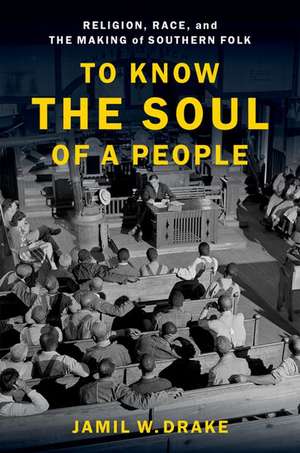To Know the Soul of a People: Religion, Race, and the Making of Southern Folk
Autor Jamil W. Drakeen Limba Engleză Paperback – 31 mar 2022
| Toate formatele și edițiile | Preț | Express |
|---|---|---|
| Paperback (1) | 156.35 lei 10-16 zile | +37.31 lei 4-10 zile |
| Oxford University Press – 31 mar 2022 | 156.35 lei 10-16 zile | +37.31 lei 4-10 zile |
| Hardback (1) | 713.72 lei 31-37 zile | |
| Oxford University Press – 31 mar 2022 | 713.72 lei 31-37 zile |
Preț: 156.35 lei
Preț vechi: 180.60 lei
-13% Nou
Puncte Express: 235
Preț estimativ în valută:
29.92€ • 31.32$ • 24.90£
29.92€ • 31.32$ • 24.90£
Carte disponibilă
Livrare economică 27 februarie-05 martie
Livrare express 21-27 februarie pentru 47.30 lei
Preluare comenzi: 021 569.72.76
Specificații
ISBN-13: 9780190082697
ISBN-10: 0190082690
Pagini: 288
Dimensiuni: 142 x 209 x 19 mm
Greutate: 0.34 kg
Editura: Oxford University Press
Colecția OUP USA
Locul publicării:New York, United States
ISBN-10: 0190082690
Pagini: 288
Dimensiuni: 142 x 209 x 19 mm
Greutate: 0.34 kg
Editura: Oxford University Press
Colecția OUP USA
Locul publicării:New York, United States
Recenzii
Drake's well-written, important, timely examination of these pioneering studies is excellent.... Highly recommended.
Drake outlines with precision social scientific constructions of the category of 'folk religion' and demonstrates the significance of ideas about religion to liberal reformers' analyses of Black cultures, family, labor, and health. He shows how their analyses contributed to moralizing discourses about race and poverty and supported government policies aimed at 'modernizing' Black culture. The book provides new tools to understand the connections among religion, race, and class in African American history.
Jamil Drake follows Depression-era social scientists who spread across the rural U.S. South-particularly the Black rural South-in search of an explanation for its entrenched poverty and resistance to modernization. They found 'folk religion,' a category that challenged biological racism but entrenched a cultural critique of poor black southerners that remains with us. This is a timely, sobering, and important book
Drake outlines with precision social scientific constructions of the category of 'folk religion' and demonstrates the significance of ideas about religion to liberal reformers' analyses of Black cultures, family, labor, and health. He shows how their analyses contributed to moralizing discourses about race and poverty and supported government policies aimed at 'modernizing' Black culture. The book provides new tools to understand the connections among religion, race, and class in African American history.
Jamil Drake follows Depression-era social scientists who spread across the rural U.S. South-particularly the Black rural South-in search of an explanation for its entrenched poverty and resistance to modernization. They found 'folk religion,' a category that challenged biological racism but entrenched a cultural critique of poor black southerners that remains with us. This is a timely, sobering, and important book
Notă biografică
Jamil W. Drake is Assistant Professor of Religion at Florida State University. He teaches and researches in the area of American Religious History, with a specific concentration in African-American religion and politics. His work explores the relationship between race, science, and state governance.
